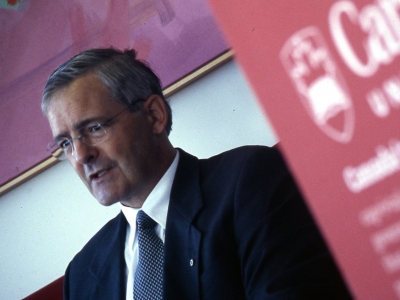Carleton University’s Ashraf Matrawy has received funding from TELUS and the Natural Sciences and Engineering Research Council of Canada (NSERC) as part of the Collaborative Research and Development (CRD) grants program for his work on secure network slicing for 5G services.
Matrawy’s research focuses on 5G security, a major strength in research at Carleton. The project received $510,000 cash and provides $150,000 of in-kind contributions.
“Carleton University is known globally as a leader in telecommunications research,” said Rafik Goubran, vice-president (Research and International). “This newest partnership with NSERC and TELUS will further ensure the security of 5G networks, which will benefit the industry but also have a beneficial impact on Canadians.”
Future network services will rely on a 5G infrastructure. This infrastructure is critical for many Internet service providers (ISPs), including TELUS. As a leading managed security services provider and a major component of Canada’s national critical infrastructure, TELUS will work with Carleton on this initiative to strengthen the 5G network and reinforce Canada’s leading role in mobility security.
“5G technology goes beyond being a new cellular communication technology — it is an important infrastructure tool that supports a variety of industries,” said Matrawy, professor in the School of Information Technology. “Security in this new context is very important.”
Traditional security concerns may not hold true in a 5G environment that embraces a large number of access points to increase coverage and capacity. The result is an expanded collection of points where a system could be compromised. This exposes the network core to a greater risk of attack. The impact of attacks may be higher due to the scale of the 5G network and the higher data rates available to both users and attackers.
Network slicing allocates a portion of a network to users based on their needs, whether they are an individual or a company. This is key to providing flexible, scalable and on-demand solutions for a vast array of services using 5G networks. Given the nature of 5G architecture, security challenges related to slicing will exist while trying to meet the strict requirements in ultra-low-latency and device-to-device communications.
Matrawy will study techniques and strategies to mitigate risks associated with network slicing in 5G networks. He will follow a risk-mitigation approach and will rely on creating new threat models and defence and traffic management techniques. This research will be instrumental in shaping security strategy for critical information infrastructure operators such as TELUS.
Media Contact
Elizabeth Murphy
Communications Co-ordinator
Carleton University
613-520-2600, ext. 8834
Elizabeth.Murphy@carleton.ca
Follow us on Twitter: www.twitter.com/Cunewsroom
Need an expert? Go to: www.carleton.ca/newsroom/experts
Tuesday, March 3, 2020 in News Releases
Share: Twitter, Facebook



